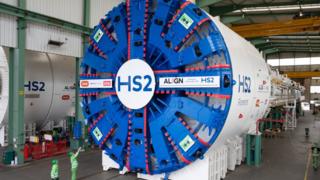 Image copyright
Image copyright
HS2
The 2,000-tonne machines will make a tunnel under the Chilterns starting in 2021
Two tunnelling machines bought to help build HS2 have been unveiled by the firm behind the high-speed rail line.
The excavators will bore a 10 mile (16km) tunnel through part of the Chilterns, from a site near the M25 to near South Heath in Buckinghamshire,
HS2 Ltd chief executive Mark Thurston said the machines would “be a defining moment in the history of HS2”.
But campaigners said HS2 was “decimating countryside and creating a huge financial burden”.
The two 2,000-tonne machines, built at a factory in Germany, will dig as deep as 80m (262ft) below ground.
They have been named Cecilia and Florence, after Buckinghamshire-born astronomer Cecilia Payne-Gaposchkin and Florence Nightingale, following a public vote from a shortlist of suggestions made by local schoolchildren.
Image copyright
HS2
The site near Rickmansworth in Hertfordshire, next to the M25, where the tunnel will start has been cleared
The plans for HS2 were first outlined more than a decade ago. The initial stage, due to be completed between 2028-31, will connect London and the West Midlands, while the second section will extend into the East Midlands and north of England.
HS2 minister Andrew Stephenson said: “HS2 will provide better, more reliable connections that truly level up our country, boosting economic growth and sharing opportunities.”
Florence will be launched in early 2021, with Cecilia beginning the other half of the tunnel about a month later.
Both machines are 170m (558ft) long and have been designed for the chalk and flint under the Chilterns.
They will run almost non-stop and are expected to take about three years to excavate the tunnel, which will be lined with concrete.
In May, a report by MPs found the project was “badly off course” and accused HS2 Ltd and the Department for Transport of lacking transparency and undermining public confidence.
Campaigners against HS2 staged a week-long protest along the line’s route in June, saying funds for the project should be used for the country’s economic recovery following the coronavirus lockdown instead.
Find BBC News: East of England on Facebook, Instagram and Twitter. If you have a story suggestion email eastofenglandnews@bbc.co.uk